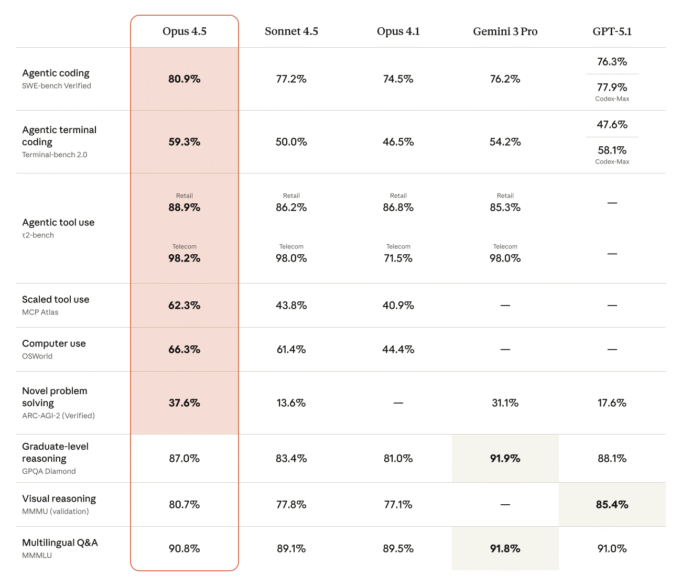Claude Opus 4.5 just dropped, and the benchmarks are stunning. Anthropic’s flagship model achieves 80.9% on SWE-bench Verified — the first model to break 80% on real-world software engineering tasks.
It beats Google’s Gemini 3 Pro (76.2%), OpenAI’s GPT-5.1-Codex-Max (77.9%), and even Anthropic’s own Sonnet 4.5 (77.2%). On Anthropic’s internal engineering exam, Opus 4.5 scored higher than any human candidate ever has.
| Benchmark | Opus 4.5 | Gemini 3 Pro | GPT-5.1 |
|---|---|---|---|
| SWE-bench Verified | 80.9% | 76.2% | 77.9% |
| Terminal-bench 2.0 | 59.3% | 54.2% | 47.6% |
| Computer Use (OSWorld) | 66.3% | — | 44.4% |
The $20 Pro Plan Reality
Here’s the catch: You can’t meaningfully use Opus 4.5 on the $20 Pro plan.
One user’s experience perfectly captures the problem:
“I bought the $20 premium plan, asked it to build a 3D room decorator with Three.js, hit the context limit. Pressed continue. Hit it again. And again. I ran into the daily message limit. So in the end I never actually tried Opus 4.5.”
According to Anthropic’s documentation, Pro users get approximately 10-40 prompts with Claude Code every five hours. For intensive Opus 4.5 work, that evaporates fast.
Plan Breakdown: What You Actually Get
| Plan | Price | Opus Access | Reality Check |
|---|---|---|---|
| Free | $0 | ❌ None | Sonnet/Haiku only |
| Pro | $20/mo | ⚠️ Limited | 10-40 Claude Code prompts/5hrs |
| Max 5x | $100/mo | ✅ Yes | 15-35 Opus hours/week |
| Max 20x | $200/mo | ✅ Full | 24-40 Opus hours/week |
As ClaudeLog explains, Pro subscribers hit usage caps quickly with Opus, especially on large codebases. The system automatically downgrades Max 5x users to Sonnet at 20% usage to preserve quota.
The Pricing Revolution
Despite subscription limits, API pricing is genuinely impressive. Opus 4.5 costs $5/million input tokens and $25/million output — a 66% reduction from Opus 4.1’s $15/$75.
As WinBuzzer reports, this attacks the “primary economic barrier to autonomous AI agents.” Combined with the new “effort parameter” (low/medium/high), developers can balance cost against performance.
At medium effort, Opus 4.5 matches Sonnet 4.5’s SWE-bench score while using 76% fewer output tokens. Even at high effort, it uses 48% fewer tokens than Sonnet while performing better.
What Makes Opus 4.5 Different
According to Anthropic’s product page, Opus 4.5 introduces several architectural improvements:
- Tool Search: Reduces context bloat by 85% through on-demand tool discovery
- Effort Parameter: Dial to trade intelligence for cost/latency
- Enhanced Memory: Better long-context operations for exploring codebases
- Self-Improving Agents: Reaches peak performance in 4 iterations vs. 10 for competitors
As TechCrunch notes, Opus 4.5 also powers new integrations: Claude for Chrome (Max users) and Claude for Excel (Max/Team/Enterprise).
The Workarounds
If you’re on Pro and want to actually use Opus 4.5:
- Enable Extra Usage: Switch to pay-as-you-go pricing at API rates after limits
- Use the API directly: $5/$25 per million tokens with precise cost control
- Upgrade to Max 5x: $100/month for 15-35 Opus hours/week
- Strategic model switching: Use Sonnet for 80% of tasks, reserve Opus for complex work
- Batch your requests: Plan intensive sessions around 5-hour usage windows
As AWS notes, Opus 4.5 is now available in Amazon Bedrock, Google Cloud Vertex AI, and Anthropic’s native API for enterprise workflows.
What About Claude Code?
Claude Code — the terminal-based coding environment — has a similar problem. According to DataStudios, you can’t access Opus in Claude Code on Pro plans at all. It’s Sonnet only.
Max subscribers can switch between models using /model, but the system auto-switches to Sonnet when you hit usage thresholds to prevent accidentally burning through limits.
For serious Opus 4.5 usage, you need:
- Max 5x ($100/mo) minimum for moderate use
- Max 20x ($200/mo) for heavy development
- API access for production workloads
The Pro plan’s Opus access is more “taste test” than daily driver. If you’re serious about using Opus 4.5, budget accordingly — or stick with Sonnet 4.5, which remains excellent and far more accessible.

